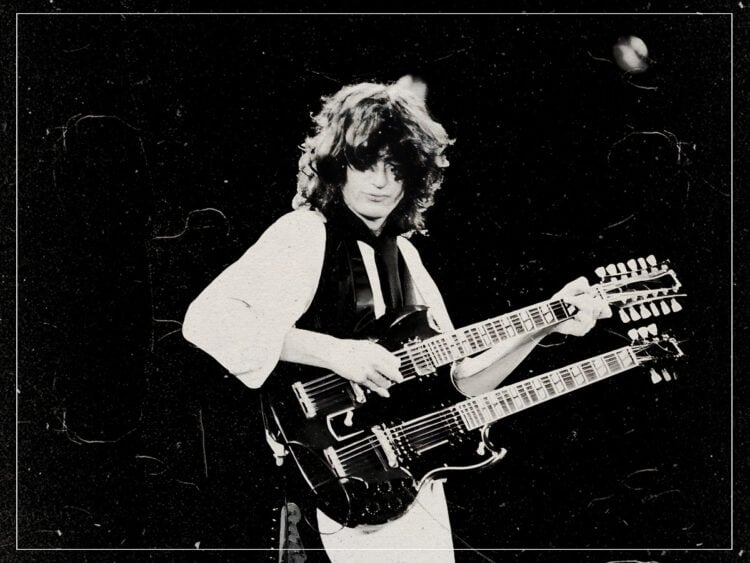News How Jimmy Page paved the way for grunge
Although classic rock’s relevance might be waning in the contemporary era, very few can doubt the cultural impact of its most prominent figures. One man who had a defining consequence in this period was Led Zeppelin guitarist and leader Jimmy Page, whose efforts were of such gravity that they also helped pave the way for a genre’s advent years in the future: grunge.
Grunge has always been deemed a spiritual successor to classic rock, but those who are often given the most credit for its emergence are the likes of Neil Young and Jimi Hendrix. However, Jimmy Page had just as much impact on how the genre unfolded. For instance, most of the grunge forerunners have cited Page and his band as key influences. Although grunge’s definitive icon, Kurt Cobain, was open about his adulthood disdain for Led Zeppelin on a thematic level, as a younger man he did enjoy their melodies and even covered ‘Immigrant Song’ with Nirvana in their early years.
However, more explicitly, Cobain’s peers from grunge’s other leading bands were open about their love of Jimmy Page and his work with Led Zeppelin. It is also no surprise, then, that their work is also much more clearly steeped in blues-style melodies and chromaticism than that of Nirvana, who always struck a more innovative, distinctly alternative rock route, which was deeply ensconced in the sound and ethos of punk.
One man who has been open about Page and Led Zeppelin’s impact on him is Alice in Chains guitarist Jerry Cantrell. Speaking to The Quietus, he explained: “Jimmy Page is another guitar player that means a lot to me. Every member of that fucking band: John Paul Jones was an amazing writer, arranger and producer, as well as Jimmy. Plus John Bonham and Robert Plant… that’s one of the greatest rock & roll bands of all times.”
Cantrell also drew a crucial characteristic parallel between Zeppelin’s approach and that of the common grunge one utilised by his band, Pearl Jam and Soundgarden: “It’s just straight-up, fucking sexy, kick ass and shit, man! All the way from dirty, low-down rock and roll to the biggest orchestral tracks like ‘Kashmir’. They travelled a lot of ground while keeping their roots intact, the blues.”
Most interestingly, though, was how Cantrell outlined Led Zeppelin’s importance to the Seattle scene at large: “You know, certain bands really resonate in certain areas and that was one band that was always popular up there where I come from, the northwest,” he added. “You have at least ten fucking Zeppelin songs that you can jam with anybody at any time.”
Pearl Jam are another band inextricable from Page and Led Zeppelin. This connection comes through the classic rock-evoking licks of Mike McCready and Stone Gossard as well as frontman Eddie Vedder’s primal vocals, which instantly conjure the image of a young Robert Plant, bent backwards, wailing into the microphone. Gossard has always been open about Zeppelin’s significance to his artistry and told Stereogum in 2013 that they remain among his central influences.
More tangibly, Zeppelin frontman Robert Plant has gone as far as to claim that Pearl Jam’s ‘Given To Fly’ might well be a rip-off of the 1971 Led Zeppelin IV classic, ‘Going to California’. As many fans pointed out, the similarities are uncanny.
So, how exactly did Jimmy Page inspire grunge? Well, it all started with an idea. This concept, which he first conceived at the end of his previous band, The Yardbirds, would lead him to form ‘The New Yardbirds’, who, before too long, would change their name to Led Zeppelin. From the very start, Page was clear that he wanted Zeppelin’s music to be “a marriage of blues, hard rock and acoustic music topped with heavy choruses”.
You can also hear this idea start to form in Page’s tenure in The Yardbirds, where, alongside brief co-lead guitarist and friend Jeff Beck, on songs such as ‘Happenings Ten Years Time Ago’, they pushed the guitar and rock music into a much darker more pulsating space than it had been. The guitar was now the primary weapon of a rock band, eclipsing the vocals in excitement and sheer sonic force. This single preceded the immense developments of psychedelic rock that occurred the following year, 1967.
Whether it be early cuts such as ‘Communication Breakdown’, which is one of the clearest forebears to grunge sonics by way of its almost chainsaw guitar and frenetic energy, or later ones such as ‘Immigrant Song’, which appears to exemplify the dark intrigue key to much of the Seattle sound, or even ‘Black Dog’, which placed heavy-riffing at the centre of the track, but also took this idea down a very leftfield, complex path, the examples of Jimmy Page signalling the eventual coming of grunge with his work with Led Zeppelin are myriad.
In terms of Led Zeppelin’s attitude-laden but expansive blues-rock being present in grunge, fans don’t have to look far. While metallic and detuned, Cantrell’s thunderous guitar parts on Alice in Chain’s ‘Them Bones’ – and all the chromaticism it contains – is like a more muscular cousin to early Page performances on the first two Zeppelin records, including, in the chorus, the chord progression of ‘Good Times Bad Times’. On the other side of the coin with the use of the acoustic guitar, there are also some stylistic similarities, including power ballads such as ‘Down in a Hole’, which takes a lot from the more melancholic facets of Led Zeppelin IV and the more refined albums that came after such as Houses of the Holy and cuts such as ‘The Rain Song’.
More examples are available in the Pearl Jam oeuvre than the rest of their peers. Even just mentioning the rumbling verse passage of ‘How Many More Times’, with its 4/4 rhythm and repetitive pentatonic riff – a trick plucked straight from the blues handbook by Page – brings to mind Pearl Jam staples such as ‘Even Flow’ and ‘Alive’. These songs amp up Zeppelin’s formula and blend it with a touch of punk, à la the general Generation X attitude. Elsewhere, the grooving smut of ‘Whole Lotta Love’ can be connected to the overall vibe of the band’s first two albums, 1991’s Ten and 1993’s Vs.
While the fanfare of Jimmy Page’s work might centre around the quality of his guitar-playing, songwriting and production, on a much more forensic level than immediately apparent, his contribution with Led Zeppelin changed the world far outside of the classic rock period. Without grunge, culture as we know it would be considerably different, and, astonishingly, a significant portion of its success can be traced back to a man so removed from 1991 and the cultural tidal wave of Nirvana, Pearl Jam, Alice in Chains and Soundgarden.




